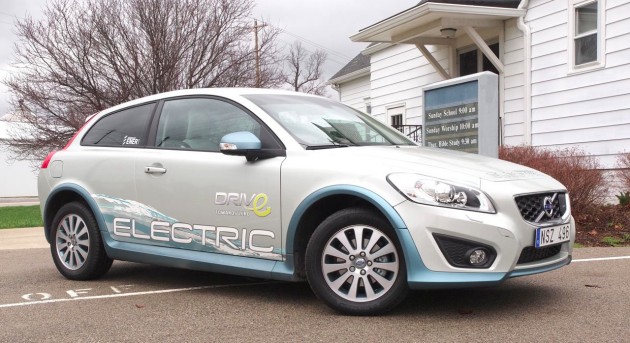The Sweden House is a smart, clean-looking building in Washington, D.C.'s Georgetown district that serves as that country's embassy in the United States. On a hot June morning last week, the House opened its doors to Volvo, Sweden's biggest automaker, for a morning seminar titled
Innovation Towards Zero that covered the ways the company is trying to further the cause of sustainable mobility in a global market. The short version is as follows: Volvo plans to use a wide variety of fuel-saving methods in its upcoming vehicles because it thinks the focus should be on the end result (lower CO2 emissions) and not on any particular technology. So, while it's clear that plug-ins will play a role for Volvo – and the C30 Electric and V60 Plug-In Hybrid were certainly the vehicles du jour – there's no way Volvo is putting all of its technological eggs into one specific basket.
Even though there is a big push for electrified vehicles across the industry, Volvo does not have a timeline for when all of its models will be electrified, or when something like that would be an option for each model. Volvo CEO Stefan Jacoby told AutoblogGreen:
To get to a cleaner lifestyle with cleaner vehicles, Volvo sees many parts of peoples' lives working together, similar to the way the Lindell family lived during Volvo's "One Tonne Life" (well, almost) project for six months. This is also how fossil fuels and electricity will work together in Volvo cars in the coming years. The perfect example of this is the V60 Plug-In Hybrid, which Jacoby announced would be coming to America with a gasoline engine.
That doesn't mean that the all-electric C30 Electric isn't a successful project. Jacoby said that the 250 vehicles in the C30 EV test fleet are "more or less sold out." Jacoby acknowledged that the $2,100 per month lease (!) price is, "more than you pay for a conventional car but it is important to understand that we are more or less in the trial and error phase. We want to control and monitor the batteries and that's why we will lease them for the time being." Getting the batteries back at the end of the lease to test them and see how they held up to daily driving is the main reason why Volvo will not offer lessees the chance to buy the cars when the three-year leases are up.
Volvo's Lennart Stegland was on hand as well, and once again was emphasizing Volvo's safety message (see here and here). He said that Volvo has so far "demolished" (i.e., crash tested) 12 C30 Electrics, and that more will be subjected to the process in the future. From the testing done so far, Stegland said that the C30's battery should last 3,000 cycles, or about eight years, and will then have around 80 percent of its starting capacity left, which Stegland said was on target. It is comparable with other battery life estimates from other automakers.
You can watch some video from the Innovation Towards Zero seminar below.
Our travel and lodging for this media event were provided by Volvo.
Even though there is a big push for electrified vehicles across the industry, Volvo does not have a timeline for when all of its models will be electrified, or when something like that would be an option for each model. Volvo CEO Stefan Jacoby told AutoblogGreen:
Continue reading...[The technology used] depends very much on the CO2 standards, that's the guiding line, more or less... We should not forget that the traditional internal combustion engine can significantly be improved and the benefits out of this can be made with less investment and complexity. We are [in] a long transition period from fossil fuels towards alternative powertrains and we need to understand that we have to be careful to not invest into the wrong direction.
To get to a cleaner lifestyle with cleaner vehicles, Volvo sees many parts of peoples' lives working together, similar to the way the Lindell family lived during Volvo's "One Tonne Life" (well, almost) project for six months. This is also how fossil fuels and electricity will work together in Volvo cars in the coming years. The perfect example of this is the V60 Plug-In Hybrid, which Jacoby announced would be coming to America with a gasoline engine.
That doesn't mean that the all-electric C30 Electric isn't a successful project. Jacoby said that the 250 vehicles in the C30 EV test fleet are "more or less sold out." Jacoby acknowledged that the $2,100 per month lease (!) price is, "more than you pay for a conventional car but it is important to understand that we are more or less in the trial and error phase. We want to control and monitor the batteries and that's why we will lease them for the time being." Getting the batteries back at the end of the lease to test them and see how they held up to daily driving is the main reason why Volvo will not offer lessees the chance to buy the cars when the three-year leases are up.
Volvo's Lennart Stegland was on hand as well, and once again was emphasizing Volvo's safety message (see here and here). He said that Volvo has so far "demolished" (i.e., crash tested) 12 C30 Electrics, and that more will be subjected to the process in the future. From the testing done so far, Stegland said that the C30's battery should last 3,000 cycles, or about eight years, and will then have around 80 percent of its starting capacity left, which Stegland said was on target. It is comparable with other battery life estimates from other automakers.
You can watch some video from the Innovation Towards Zero seminar below.
Our travel and lodging for this media event were provided by Volvo.



Sign in to post
Please sign in to leave a comment.
Continue